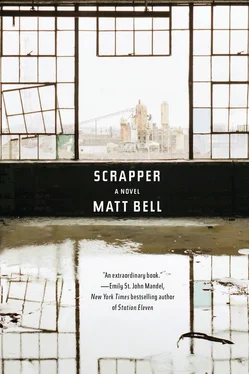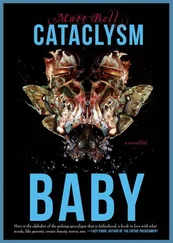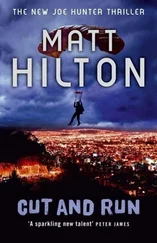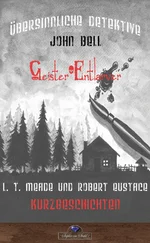He had been questioned when the brother was reported missing, again when the brother’s car was found stripped a week later. Sanchez again, bulky as ever but now smaller than Kelly, the detective diminished by Kelly’s new size. But there were no suspect fingerprints and without a body Kelly didn’t have to tell the detective what had happened next, how after Kelly left the low room he walked from the blackened buildings of the plant out into the fading hours of night and into the predawn of the city, to a certain house in the zone, a certain driveway in a devastated block where he had left his truck overnight, where the brother had taken the boy the last day he had followed him, the day Kelly finished the case notes.
When Kelly talked to Sanchez he had wanted to tell him about the boy’s father, about the brother’s last accusations. He had wanted to say that if he could have found the man in the red slicker he would have taken him first. But instead he had told himself the brother had not spoken in the low room and now he was no longer sure the man in the red slicker had ever been real. Now it was impossible for Kelly to see anyone else but the brother in the low room’s chair.
There hadn’t been running water in the house but in the truck there was bleach. He’d known it wouldn’t remove everything but it would remove enough. In the dark basement he’d stripped, scrubbed his hands, his face, his neck and chest, twisted against the burn of the bleach. He lit another fire, sat on the basement steps and shook while his spent clothes smoldered on the concrete.
When he’d arrived at her apartment she was already on the kitchen floor, slumped away from the counter, her feet splayed awkwardly, her face awake but her tongue stilled and her body turned out of sensible position. The burner had been turned on high to boil water, the apartment filled with steam long after the pot had emptied, its bottom blackened and starting to smoke. She’d been wearing slippers and one had fallen off her left foot.
Almost morning then. The city waking up. There had been alarm clocks bleeping through her apartment walls, then the first sounds of breakfast, television news. She’d been making dinner when she fell, had lain there on the tile all night.
Her cell phone was in her pocket but she hadn’t been able to reach it, couldn’t have opened her hands to work it if she had.
She couldn’t talk anymore but her eyes found him, set him to action. He shut off the stove, moved to simplify her posture, untangling her limbs and laying her flat.
He’d spoken in a low voice, spoke slowly in the careful and culled language of apology. He needed to call for help but he couldn’t call the way he looked. He had scrubbed his skin with snow and gravel and bleach but it was hardly enough. He wondered what she’d seen: he was her only hope but look at the condition he’d arrived in. Clean jeans and a t-shirt over skin roughed with grit and gore, bruised and battered from boxing and worse, hair streaked with bleach. He didn’t know what he’d looked like but he knew how he’d felt and he hadn’t felt like himself.
But himself had been a shifting thing then. Later the scrapper receded, sated, leaving something else behind, the remainder of Kelly, the broken salvor. He’d done something far from the irreducible center of the supposed law and what did it mean? Just another chink in the universe, another proof of its senselessness, its rules that did not reach all the way up from physics and chemistry and biology to define the right path of human action.
Into that gap he had put his guess.
The jersey was gone and with it all its borrowed symbolism. The gun he’d left in the low room, the sledge beside it. He’d never started praying again so there wasn’t anything to quit. Something had happened in the circle of swords but after the low room he let that feeling fly away, and as always when the last angels fled they left their ringing behind.
The morning in the girl’s apartment he’d arrived knowing the boy was safe. Then he’d found his girl was not. Now protecting her would require a more ordinary violence, a killing of the moments to come.
That morning Kelly had spoken to her in slow tones, tried to explain. He needed to know if she would die if he took a shower. He needed her to know he was going to leave the room but when he came back he would get her all the help she needed without anyone asking questions.
It was harder to clean away blood than you expected. It took so much longer than he wanted it to take. When it was done he knew he would never do anything worse. In the low room, in its aftermath, he had found the furthest expression of his corruption. Now there would be no more waiting for the blow, only this unforgivable relief.
The national anthem played and Kelly sang along, a swell of patriotism catching in his chest, how no matter what he did wrong he would always be an American. The game started but they were far enough from the ice that he had trouble following along without the girl’s constant commentary. The last greats of the past age were retired or retiring and she had mourned the passing of her giants, would have spoken in favor of their legacies, their place among the endless, the names and numbers memorialized on uniforms hung in the rafters. He watched her gaze flicking back and forth across the ice, wondered how well she could track the puck. He held a water bottle to her mouth, let her suck the straw as long as she wanted. He reached down with a thumb and wiped the corner of her mouth, dragged the cloudy spittle across the leg of his jeans. It wasn’t only her expressions that had changed. There was plenty of makeup in her apartment but he didn’t know how to apply it to her new face. He’d thought of trying to practice with her but couldn’t bring himself to do it.
There were steroids for the spasms, amphetamines for fatigue, sedatives to help her breathing. The doctors prescribed an antidepressant but somehow Kelly got the idea she didn’t want it, stopped helping her dissolve the pills on her tongue, started taking them himself instead.
She didn’t speak anymore but when agitated she laughed, a yelp, all rasp. At night Kelly might lie in their bed with his head on her fading chest, listen to her breath shallow, then recover, shallow again. The shortness of breath might be pain related, the doctors said, it might be the continued loss of involuntary systems, and one night her breathing would stop, the last breath impossible to name until it wasn’t followed by another.
The doctors kept telling him to talk to her, that her mind was sound. He said he knew, said she was the same person he’d fallen in love with. He’d promised not to forget. It was an easy mistake to make. It was a hard mistake to stop making.
He tried to say her name more often. To force it out of his stubborn mouth. It wasn’t her name he loved but he didn’t know what else to call her. Of all the things she’d lost he doubted she missed the limp.
On the ice a fight broke out and he watched the way fighting on ice was different, how it required a different kind of agility to stay up on your skates with your jersey pulled over your head and fists thumping down on your back and neck. The crowd cheered and he cheered too. He wasn’t going to the gym anymore, hadn’t sparred since the fight. He didn’t plan to ever fight again but he didn’t want his body to go to waste so he kept working out at home. He lifted her from her wheelchair into her recliner, got down on the floor between her and the television, did long series of push-ups, sit-ups, squat thrusts. He installed a pull-up bar in the doorframe between the living room and the hallway, rotated her chair to face him so they could look at each other while he did his grunting sets, shirtless and sweating.
Читать дальше












